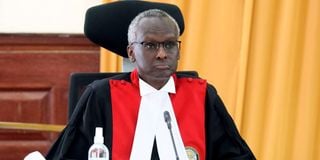Premium
Justice Lenaola criticises IEBC delays, warns of 2027 risks

Supreme Court Judge Isaac Lenaola.
What you need to know:
- Chairman Wafula Chebukati, Boya Molu and Prof Abdi Guliye left IEBC in January 2023.
- This means that the IEBC has been without a full-term commission for nearly two years.
Supreme Court Judge Isaac Lenaola has criticised the delay in constituting the Independent Electoral and Boundaries Commission (IEBC), warning that Kenya risks a monumental crisis in the 2027 General Election.
IEBC chairman Wafula Chebukati and commissioners Boya Molu and Prof Abdi Guliye left in January 2023 after their terms ended while three others — following the resignations of Juliana Cherera, Francis Wanderi, Justus Nyang’aya — resigned after earlier disputing the August 2022 election results. Ms Irene Masit was kicked out after being taken before a tribunal.
This means that the IEBC has been without a full-term commission for nearly two years, and has missed a constitutional deadline to delimit boundaries, which was set at March 2024.
At the same time, Banisa, Magarini and Ugunja constituencies cannot hold by-elections to replace their MPs due to the absence of the commissioners.
“We are busy passing legislation very quickly on subjects that are politically important, but we overlook what is extremely important for this country — the electoral commission. How can a country like ours stand on its feet if it does not have a functioning electoral commission? Elections are in 2027; this is 2024. When will this commission be prepared?” asked Judge Lenaola.
He was speaking at the regional conference on the use AI, Digital and Social Media in Elections happening at the Villa Rosa Kempinski in Nairobi organised by the Electoral Law and Governance Institute for Africa (ELGIA).
“Why don’t we use social media to impact legislation? Why don’t we, for example, create a hashtag like #AppointIEBCNow and spread it? Those who have the opportunity to influence change might actually follow it and do something,” said Judge Lenaola.
The Supreme Court judge also singled out the hold-up in the formation of an IEBC Selection panel: A stand-off over the nomination of an Azimio la Umoja One Kenya Coalition representative in the panel.
The dispute is between Mr Augustus Muli of National Liberal Party (NLP) and Ms Koki Muli of Wiper Democratic Movement.
“Why is the IEBC not being constituted? Because Azimio can’t appoint their representatives to the panel? Is that something to hold the country hostage for two years?” asked Mr Lenaola.
There is a critical delay in the review of electoral boundaries, with the deadline set for March 2024 now in the past. The Constitution, under Article 89(2), mandates the IEBC to revise constituency names and boundaries every 8 to 12 years.
However, no review has been conducted since March 2012, leaving the process overdue by more than 12 years.
Mr Lenaola also waded into another hot topic: Claims that former deputy President Rigathi Gachagua was locked out of the electronic court filing system at some point during his impeachment proceedings.
“Those of you who followed the former deputy president Rigathi Gachagua saga will remember that the judiciary’s online filing system went down at some point. Why did the platform collapse? Why did files created before 2022 become vulnerable? I want you to carry this question forward to 2027 and imagine the risks we might face if such vulnerabilities persist,” Justice Lenaola told participants.
While appearing before the National Assembly’s Petitions Committee this week, IEBC Chief Executive Officer Marjan Hussein Marjan said the commission was waiting on an advisory by the Supreme Court on whether deadline for the boundary review process could be extended, and whether the delimitation exercise can be conducted without commissioners in place.
Justice Isaac Lenaola emphasised the need to critically examine judicial independence and the use of technology in elections, particularly in light of growing challenges such as cyber-attacks, misinformation, and disinformation.
“We must review judicial independence in the face of cyber-attacks and the spread of misinformation during elections. If it was bad in 2022, I prophesy that 2027 will be even harder. Technology will be a key factor, and we must learn from the 2013, 2017, and 2022 elections to understand where we are headed,” said Judge Lenaola.
Reflecting on past electoral disputes, he noted the Supreme Court’s role in resolving issues surrounding electoral independence, the use of technology like vote counting terminals, and nomination processes.
Judge Lenaola also highlighted the vulnerabilities exposed during the 2022 petition, including coordinated online attacks against judges and the creation of fake social media accounts in his name.
“The intention was intimidation, but such efforts only backfired. Hashtags were weaponised, misinformation surged, and hate speech dominated the online space. Unfortunately, institutions like the NCIC failed to respond adequately. Their role was negligible, as they took too long to act, and no arrests were made to curb the toxicity,” the Supreme Court judge said.
Justice Lenaola called for urgent reforms and discussions on safeguarding elections, particularly the management of technology and the accountability of oversight bodies like the IEBC and the National Cohesion and Integration Commission (NCIC), to ensure electoral integrity in 2027.
“We cannot afford to approach 2027 with the same gaps we saw in 2022, Institutions like NCIC must step up. Technology will play an even bigger role, and we need robust systems to counter misinformation, hate speech, and cyber-attacks,” the judge said.





